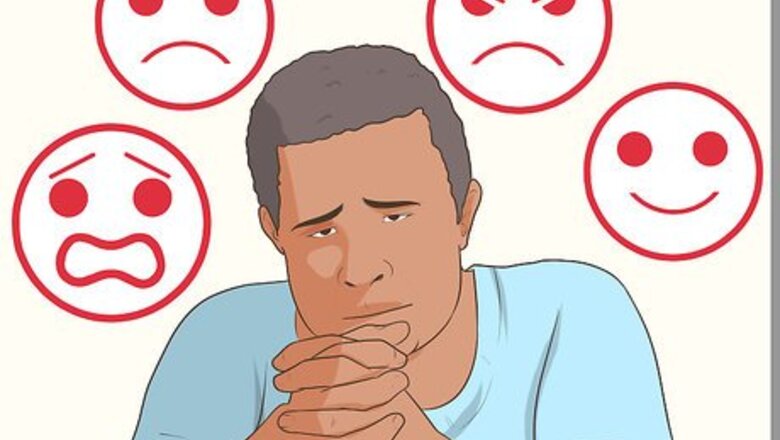
views
Protecting Your Own Self-Esteem

Be aware of your feelings. Don’t try to convince yourself that weight stigma doesn’t bother you. In the long run, it will only make you feel worse. One of the first steps in avoiding weight stigma is to acknowledge how certain comments, images, and opinions make you feel. Pay attention to what emotions you feel when you experience weight stigma. For instance, do you feel angry, hurt, embarrassed, or sad? Make a note of what exactly made you feel that way. Was it the assumptions behind the comment? Or, perhaps who made it?
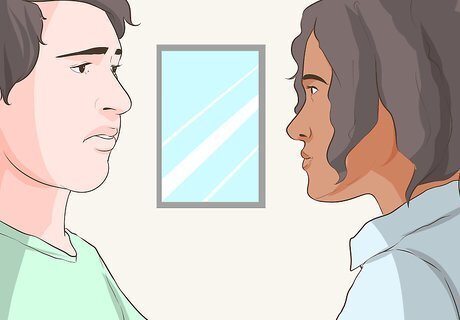
Stand up for yourself. You don’t have to get into a physical altercation if someone is stigmatizing you because of your weight. You should stand up for yourself, though. Letting people know that their comments, jokes, and actions bother you may stop them from doing it in the future. Some studies indicate that standing up for yourself is one of the most used ways of coping with weight stigma. You might say something like, “I didn’t like your comment about obese guys. I’m not the weight you think I should be, but I’m happy with myself.” You can also ask them not to stigmatize you (or anyone else) because of weight again. For instance, “Please don’t make jokes about overweight people. It’s really offensive and insensitive.”
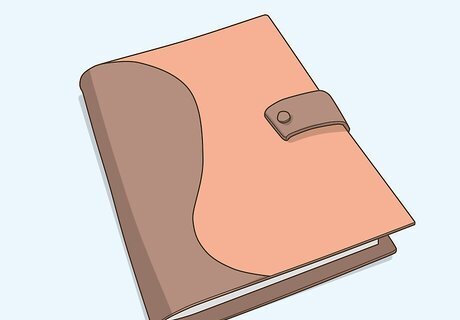
Keep a journal. If you don’t express your feelings in some way, it can build up and lead to bigger problems. You can cope with weight stigma by keeping a journal about your feelings instead of letting them build up inside you. Write about how negative situations make you feel. For example, you might write about how a joke a co-worker made about overweight people hurt your feelings. Write about your positive experiences. For instance, you could write about that cute salesclerk that flirted with you. Write about your accomplishments and achievements. For example, you might write something such as, “I earned first chair in the orchestra!”

Use positive self-talk. It can be easy to start thinking negative things about yourself when you are battling weight stigma. You may begin to believe the messages the media, society, and even people around you are giving you about weight. Combat low self-esteem and weight stigma by reminding yourself how awesome you are. Make a list of your good qualities if you need help thinking of positive things to tell yourself. Anytime you feel stigmatized because of your weight, tell yourself something like, “My weight is only one part of me. I’m also really cute, witty, and fun.” Make positive self-talk a regular part of your day. For instance, give yourself a compliment when you wake up, when you leave the house, and before bed.
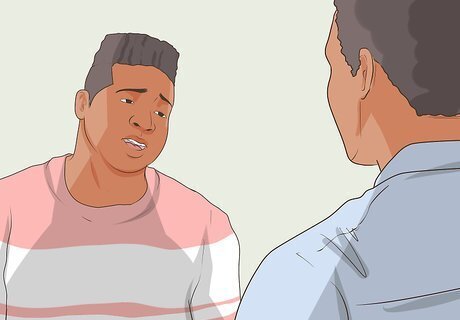
Use your support system. Relying on friends and family is a great way to avoid weight stigma. Some studies suggest that it is one of the most popular and most effective ways to cope with weight stigma. Your support system can be there to listen to you, encourage you, and even stand up for you. Talk to someone close to you about it when weight stigma is really bothering you. Or, even when it is bothering you just a little. For instance, you might say, “Could we talk for a minute? One of our classmates made a fat joke and it kind of bothered me.” Or, for example, you could try, “Can I vent to you? This salesclerk just made me feel really bad about my weight.” Listen and believe it when people that care about you give you a compliment. They’re saying it because they love you, but also because it’s true.

Participate in positive activities. Volunteering and participating in positive activities and events in your community can boost your self-esteem and give you the opportunity to meet supportive new people. It also will give you the chance to learn something new, enhance your skills, or give back to your community or a cause you support. Volunteer to mentor or tutor young children in your community. You can help shape a young mind and gain a positive outlook on life from the kids. Participate in a group exercise or martial arts class like tai chi, yoga, taekwondo, or even a hip-hop aerobics class. Learn a skill like painting, sewing, drawing, or photography.
Stopping Yourself from Stigmatizing Others
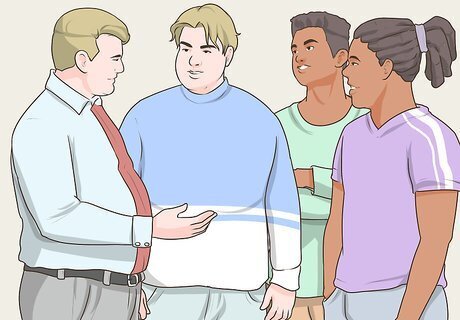
Challenge your perceptions. Some studies suggest that adults and youth have negative perceptions of overweight students. Your perceptions of people with weight challenges might cause you to treat them differently. One way that you can avoid stigmatizing other people because of their weight is to challenge your opinions about the person. When you catch yourself thinking something negative about a person with weight issues, stop yourself. Ask yourself what assumptions you are making. For instance, you might think, “I’m assuming that because she’s bigger than me, she’s unhealthy.” Remind yourself that you can’t make assumptions. You might say to yourself, “Wow! I can’t assume that about him just because of his physical appearance.”
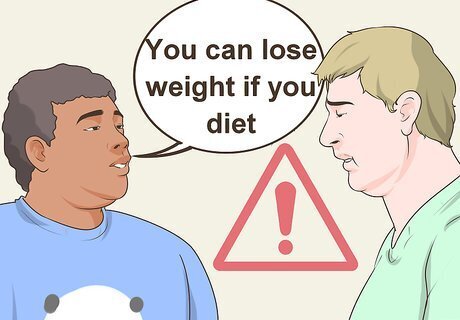
Avoid blaming the person. In some cases, a person’s weight may be beyond their control. It may be the result of a health issue, medication, or genetics. Research suggests, though, that blaming people for their weight is one common form of weight stigma. You can avoid engaging in weight stigma if you don’t blame the person for their weight. Saying things like, “You can lose weight if you diet” may seem helpful, but can actually make the person feel like their weight is their fault because they are too lazy to diet. Remind yourself that people may be overweight for a number reasons. For example, some medications and illnesses can impact a person’s weight. When you think things that may be blaming the person for their weight remind yourself, “I don’t know their story, so I can’t blame them for their size.”
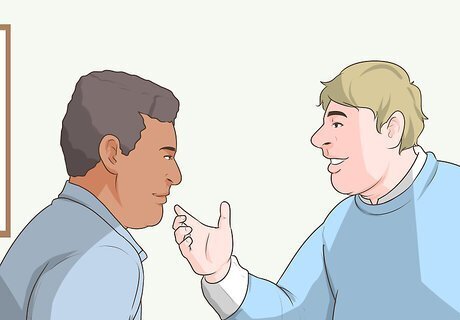
Pay attention to what you say. Once you are monitoring your thoughts about people with weight issues, you will be able to monitor the things you say, as well. Make sure that your comments, opinions, jokes, etc. are sensitive and won’t stigmatize someone because of their weight. Avoid telling jokes or repeating mean rumors about people that are overweight. Keep your opinions about others’ weight to yourself. For example, you don’t need to tell your friend that your co-worker is gaining too much weight. If you do say something insensitive, then apologize immediately. Even if the person doesn’t say anything, they did hear it and it might have hurt their feelings.

Focus on behavior, character, and personality. It is important to focus on things other than a person’s appearance. You can avoid stigmatizing people because of their weight by giving more attention to the person’s behavior, character, and personality rather than the way they look. This takes the attention off of their weight and focuses it on the things they do and say. For instance, instead of describing your teammate as overweight, you could say something like, “He’s a great guard, really enthusiastic, and encouraging." In work situations you can talk about someone’s work performance rather than talking about their weight. For instance, “She did really well on her last report.”
Promoting Acceptance of All Sizes in Your Community
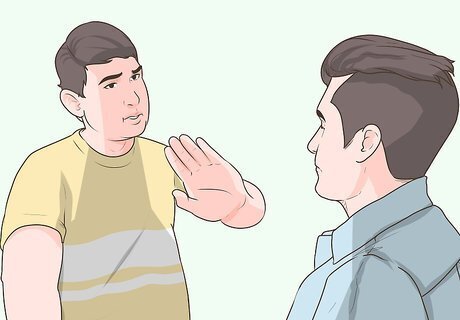
Speak up. You can avoid weight stigma becoming a part of the culture in your community by saying something when people around you start making inappropriate jokes or comments. In a lot of cases, people are stigmatized because of their weight, but they don’t say anything. Speaking up when you see weight stigma happening lets people know that what they are doing is not okay and needs to stop. You don’t have to be mean or aggressive or start a debate, but you can say something when you notice weight shaming. Try saying something like, “Please don’t say things like that. I think it’s insensitive and not what we represent here.” If you notice weight shaming in an online post you can report it as inappropriate to the site administrators.

Change public opinion. You can change the way people around you feel about people with weight issues just by saying something nice. Research indicates that people aren’t as likely to show weight stigma when they get positive feedback about the person with weight issues.You can help others avoid weight stigma by saying something positive when other people are saying negative things about an overweight person. For example, If you’re around people saying mean things about an obese classmate, you should say something nice about the person. Your one comment can change the opinion of everyone else. Point out good characteristics about the person. For instance, you might say something such as, “I don’t think she’s unhealthy. She actually has much better eating habits than me.”
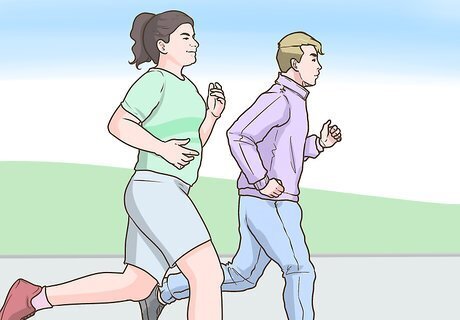
Participate in community activities. This gives you the opportunity to advocate for people with weight issues in an organized way with people who have similar interests. Taking a part in activities and events that promote positive body images, healthy self-esteem, and well-being is a way to help your community avoid weight stigma. For example, you might work with your school counselors to organize an event promoting positive self-esteem and self-image. Or, you might consider volunteering at a community center near you when they hold a fitness fair. You may also want to attend a talk about discrimination of all kinds held at your local library. Or, even give a talk yourself about weight stigma.


















Comments
0 comment